
Table of Contents
Treating Severe Anxiety the Right Way at Charlie Health

Written By: Elizabeth Kroll

Clinically Reviewed By: Dr. Don Gasparini
October 9, 2023
6 min.
Anxiety exists on a spectrum, and for some people, it is so severe that it disrupts daily life. However, with effective treatment, healing from severe anxiety is possible. In this piece, we use data to explore how Charlie Health effectively treats severe anxiety.
Learn more about our Clinical Review Process
Table of Contents
What is severe anxiety?
Anxiety, just like all other mental health conditions, exists on a spectrum of severity. While some people may experience only brief moments of jitteriness or a pit in their stomach, others may experience intermittent anxiety attacks or struggle so much with their anxiety that they have trouble getting out of bed in the morning. When someone is dealing with debilitating anxiety symptoms that interrupt daily life, their anxiety may be considered “severe anxiety” — a title that explains the severity of the anxiety and anxiety symptoms that is not in and of itself a clinical diagnosis.
When does anxiety become an anxiety disorder?
Anxiety is a natural and common feeling that everyone will experience at some point in their life. The nerves you get before a big presentation or the adrenaline that you feel when the fire alarm goes off are important signals from your body that a threat may be present, whether it’s social or physical.
However, the experience of anxiety can quickly escalate to the point of an anxiety disorder. The Diagnostic and Statistical Manual of Mental Disorders, Fifth Edition (DSM-5), which mental health professionals use to diagnose mental health conditions, explains that anxiety is “the fear of a potential threat.” According to the manual, anxiety can become an anxiety disorder when fear and worry become excessive and lead to behavioral issues like avoidance. Anxiety disorders can also present physical symptoms like a high heart rate, stomach pain, hyperventilation, and anxiety attacks.
Prevalence of anxiety disorders among young people
Anxiety disorders are the most common mental health disorders among adolescents. According to the National Institute of Mental Health (NIMH), about one-third (32%) of people ages 13 to 18 have a diagnosed anxiety disorder. Anyone can struggle with their mental health, but NIMH data shows that people who identify as female are more likely to be diagnosed with an anxiety disorder compared to those who identify as male. Also, members of the LGBTQIA+ population have a higher likelihood of an anxiety disorder diagnosis than their non-LGBTQIA+ peers, research shows.
Join the Charlie Health Library
Get mental health updates, research, insights, and resources directly to your inbox.
You can unsubscribe anytime.
Associations between anxiety disorders and other health factors
An anxiety disorder diagnosis can point to other concerns about a young person’s mental health. Studies have shown that adolescents who experience anxiety disorders are at an increased risk for future anxiety and depressive disorders, substance abuse, and disruption from school and work—all factors that are more severe for young people with severe anxiety.
This finding also translates to adults: Adults who experience anxiety tend to have lower work performance the more severe their anxiety symptoms are, and job advancement is impaired for those who fall in the severe range.
For anyone with an anxiety disorder, the diagnosis can cause risks including:
- Sleep impairments
- Suppressed immune system
- Increased risk of heart disease
- Increased risk of high blood pressure
- Increased risk of developing asthma
- Increased risk of developing irritable bowel syndrome (IBS)
Additionally, specific anxiety disorders have their own risks associated with them. According to the American Psychiatric Association, specific phobias of choking can decrease nutritional intake and cause a person to become malnourished. Someone with panic disorder has a higher likelihood of experiencing suicidal ideation and attempting suicide, even after accounting for trauma and comorbid conditions, research finds. And, those with selective mutism may experience increased social isolation as they get older, according to Dr. Elisa Shipon-Blum.
Charlie Health data: teens, severe anxiety, and treatment
All clients at Charlie Health are asked to complete a self-reported survey when they begin and end treatment. These surveys include questions about client demographics and symptomology to allow us to track client trends and improve our quality of care. Between May 2022 and March 2023, samples were collected from roughly 3,600 clients. Only clients who completed an intake and discharge survey were included in this sample. This sample, which was analyzed in April of this year, is where the data in this research piece comes from.
The majority of all Charlie Health clients screened positive for an anxiety disorder upon intake (65.6%). Among those clients, almost 40% experience anxiety symptoms so debilitating that they fall into the category of severe anxiety.

Gender-based research patterns about anxiety disorders hold true among Charlie Health clients, too: Clients who identify as female and gender minorities are 1.4 times and 1.8 times more likely, respectively, to have severe anxiety than clients who identify as male.
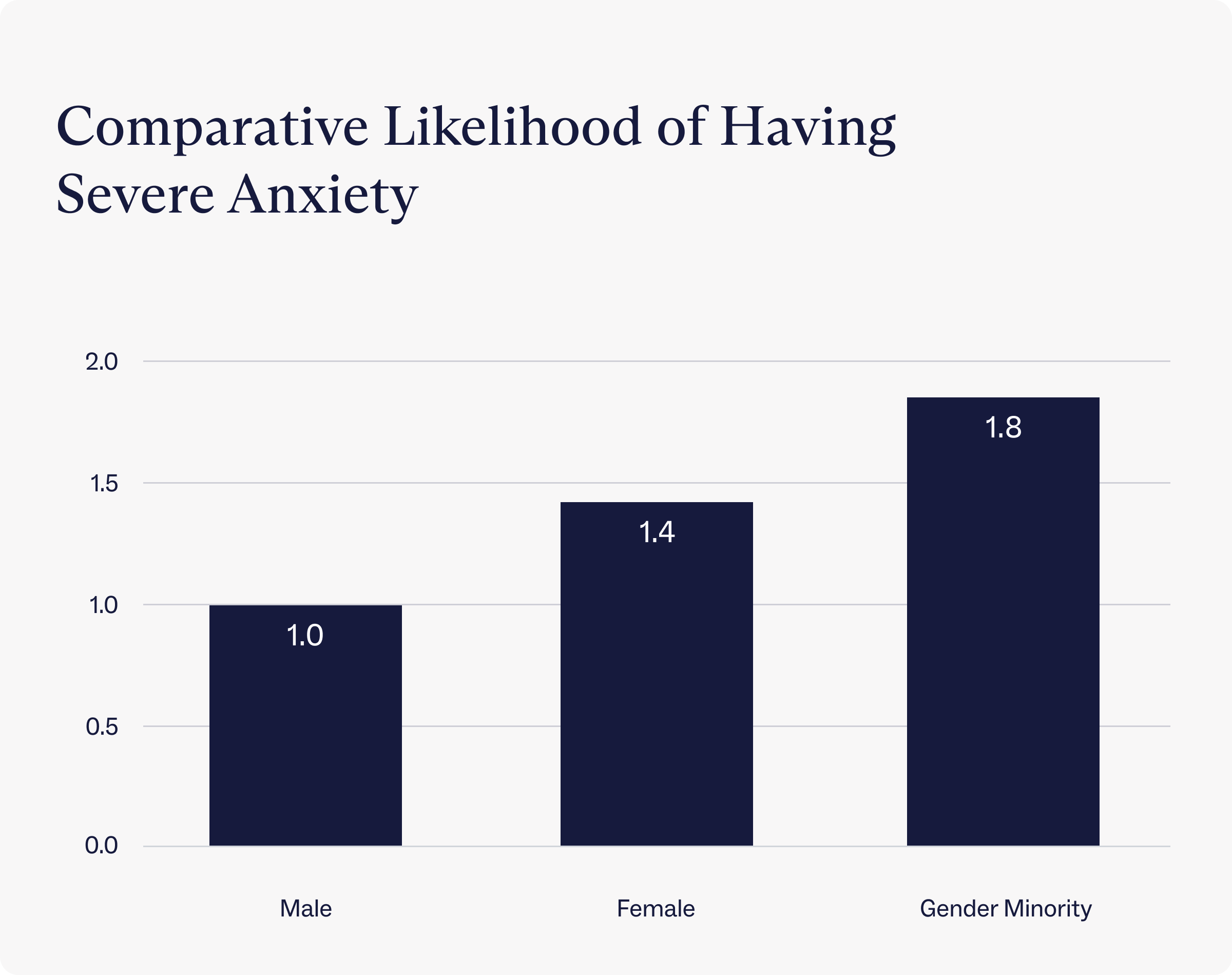
Associations between anxiety disorders and other health factors among Charlie Health clients
Upon joining treatment at Charlie Health, clients with severe anxiety were more likely to struggle with certain risk factors than their peers. Those who scored in the severely anxious category at intake missed an average of one extra day of school or work per week compared to all other clients.
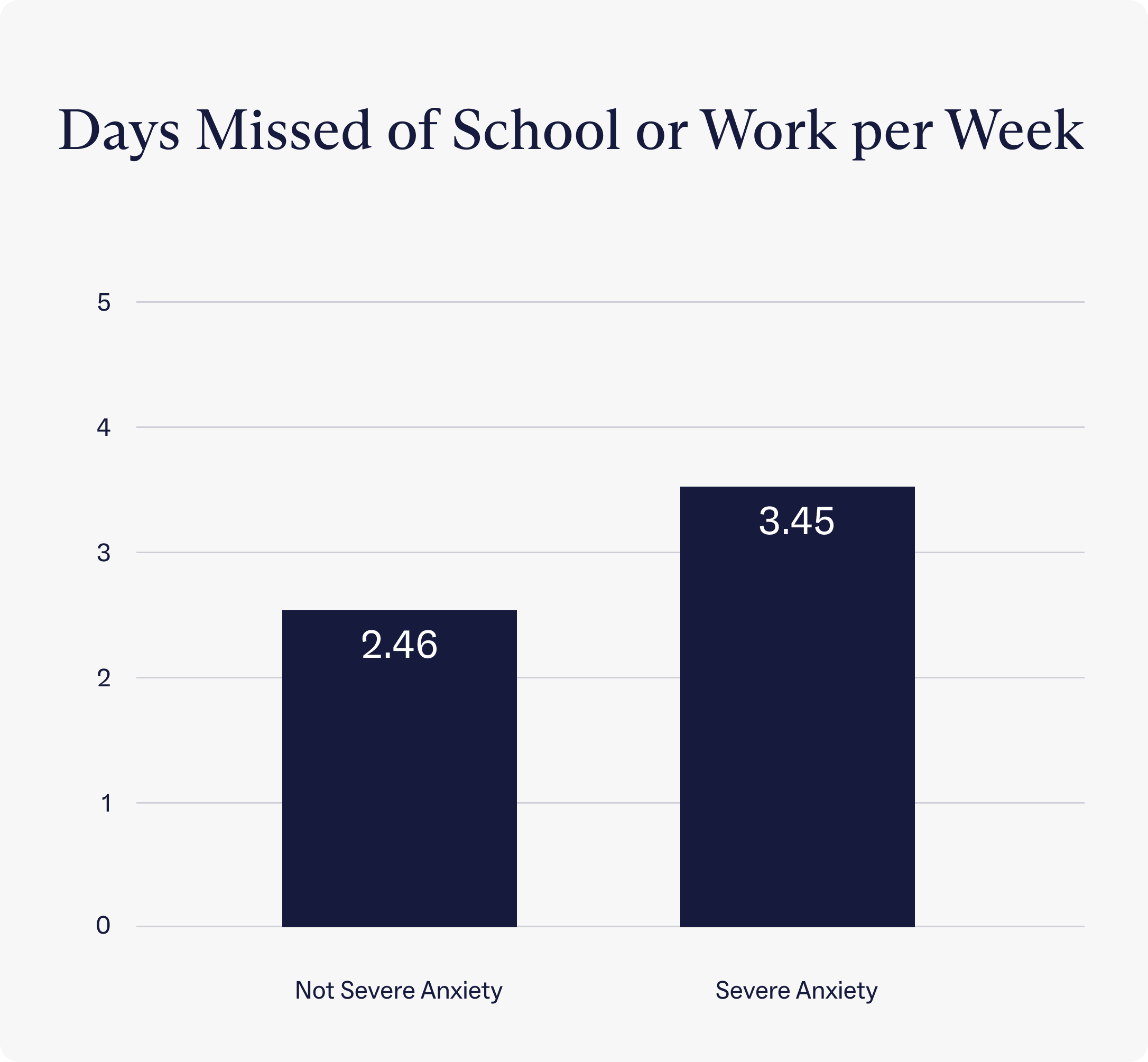
Severely anxious clients are also 1.5 times more likely to engage in self-harming behaviors and 1.1 times more likely to think about suicide while self-harming than other clients.
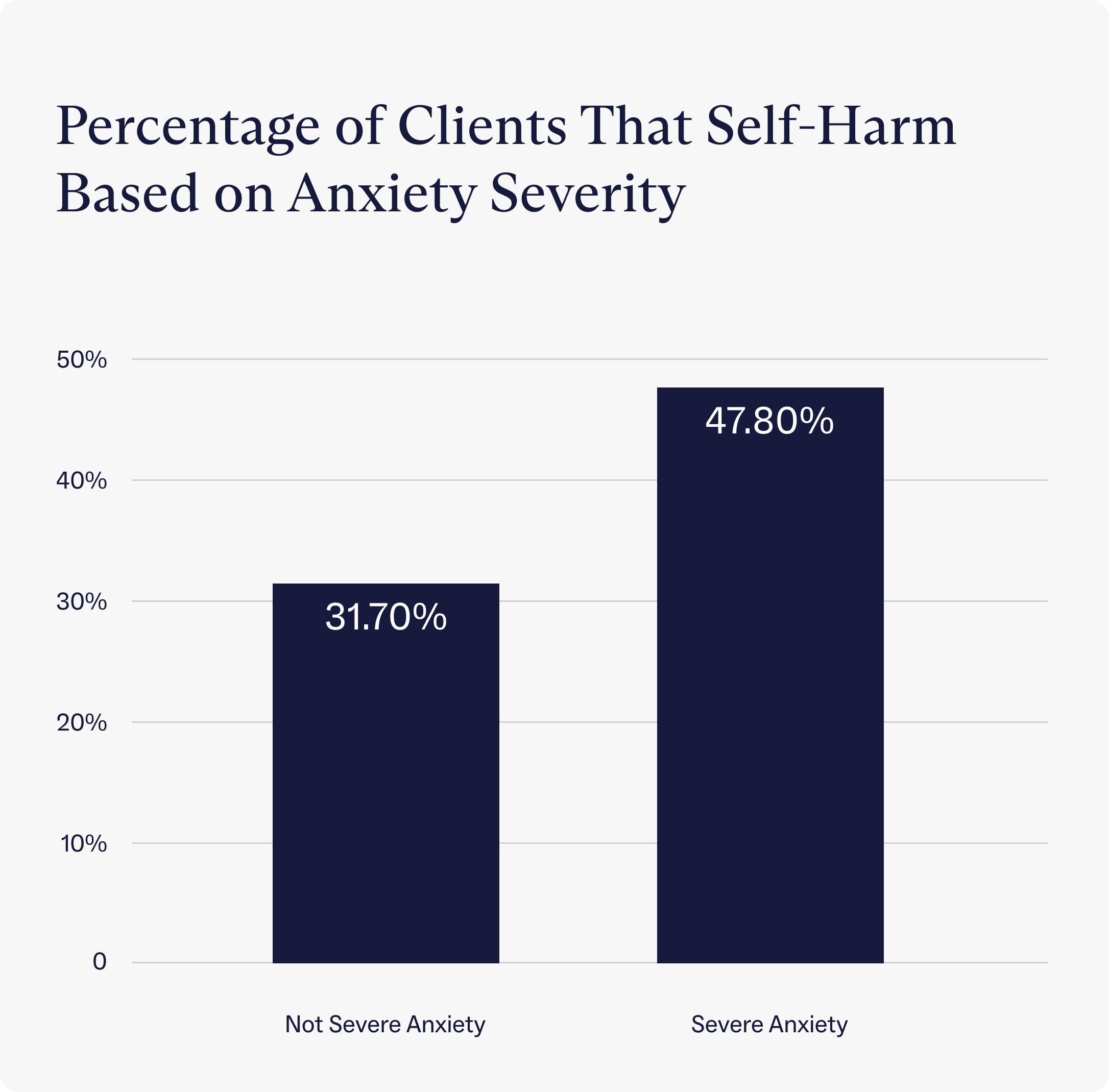
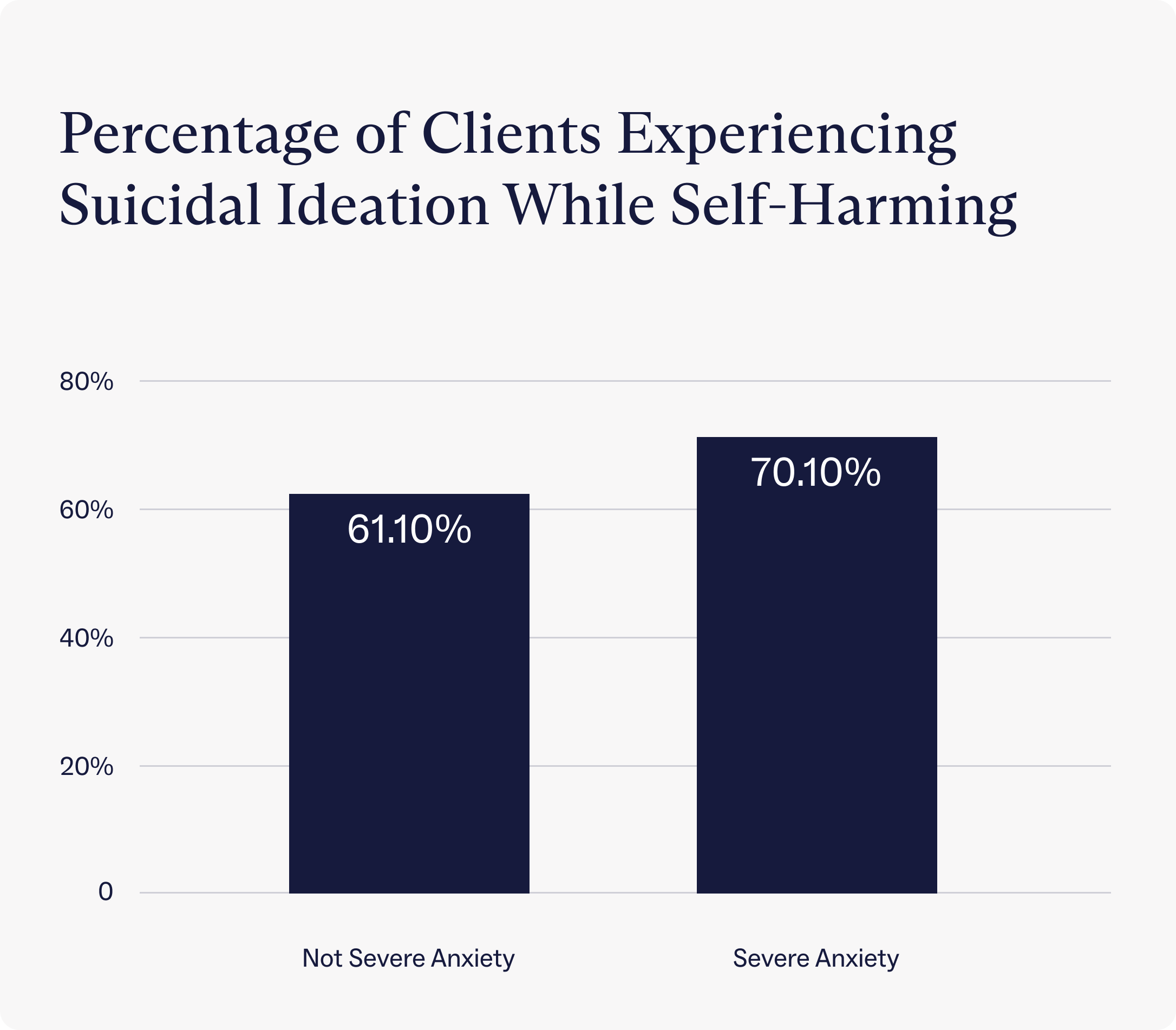
Most significantly, clients with severe anxiety are almost two times as likely to experience active suicidal ideation at intake compared to their peers.
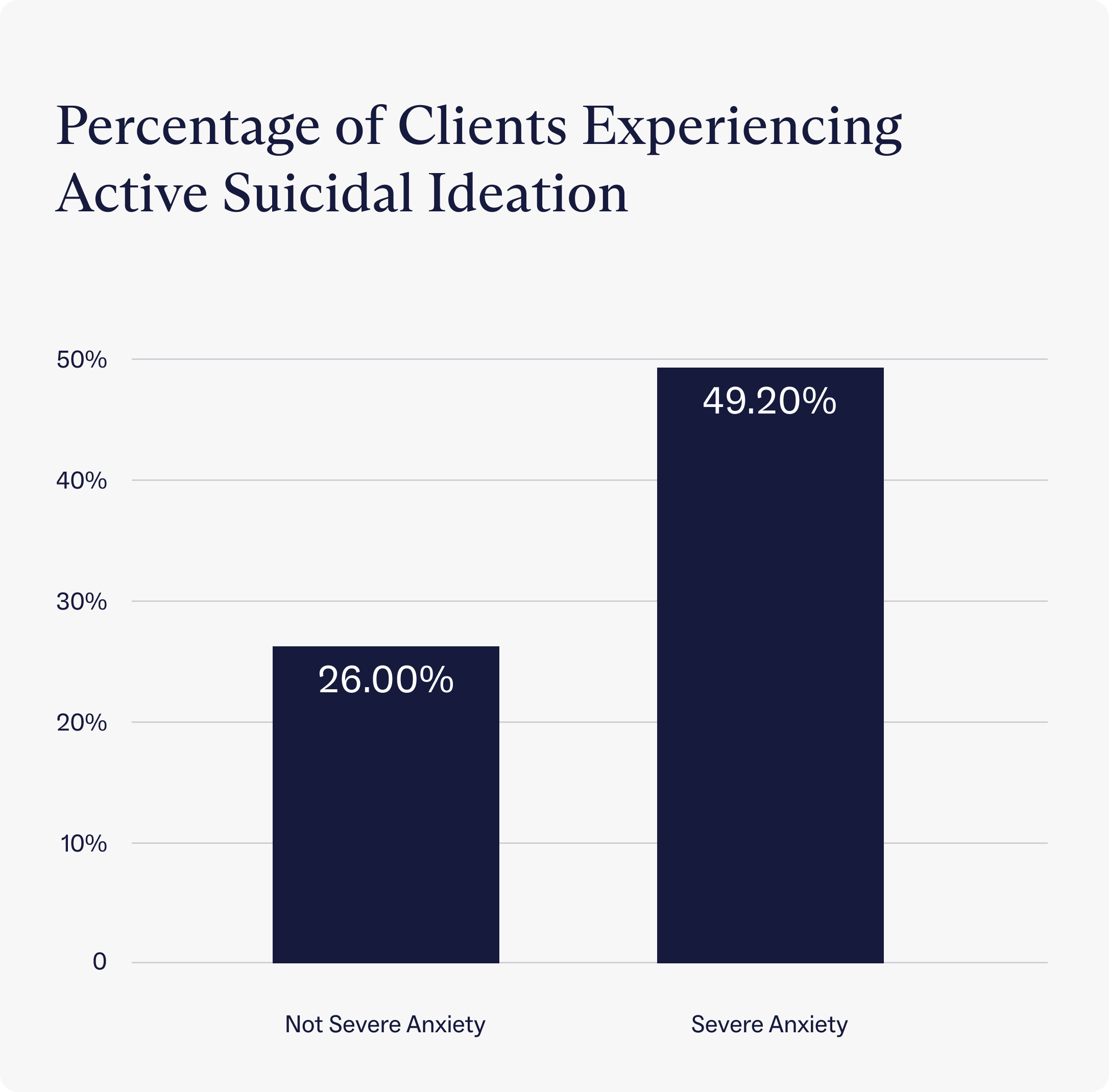
While this data doesn’t confirm that severe anxiety increases the risk of other health factors, our findings at Charlie Health are consistent with current research that’s established an association between severe anxiety and increased risk factors, including missing school and work, self-harm, and suicidality.
Charlie Health’s severe anxiety treatment works
Dealing with severe anxiety can be debilitating, but there is hope. The data gathered from Charlie Health clients at discharge underscores the positive impact of our treatment. By discharge, the rates of anxiety severity for Charlie Health patients have fully reversed, with a majority (76.4%) of clients scoring below the clinical threshold for anxiety.
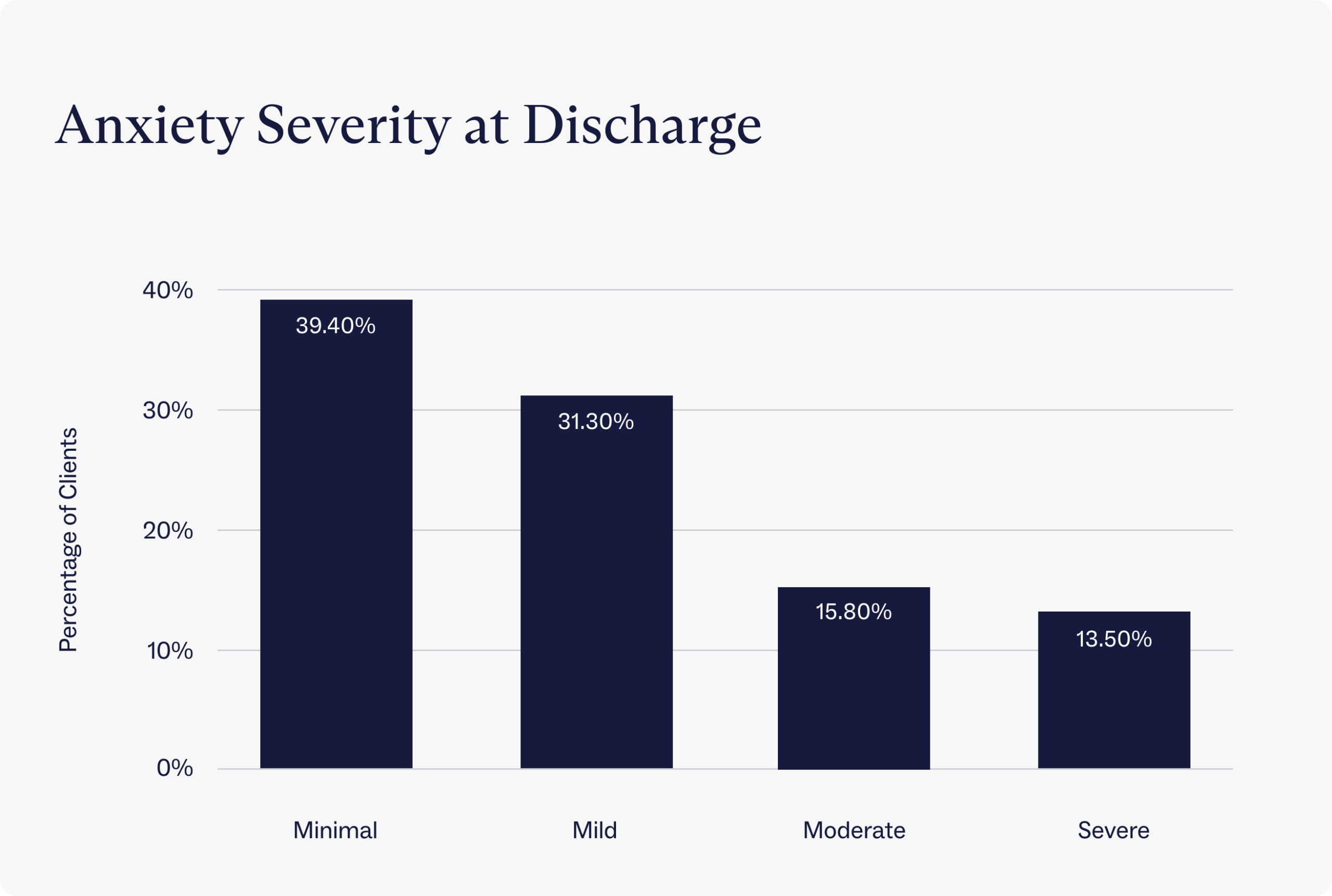
With this reduction of anxiety symptoms comes a reduction in some factors associated with severe anxiety, data shows. After treatment at Charlie Health, the number of school or work days that once-severely anxious clients missed per week fell from 3.45 days to 1.57 days, on average.
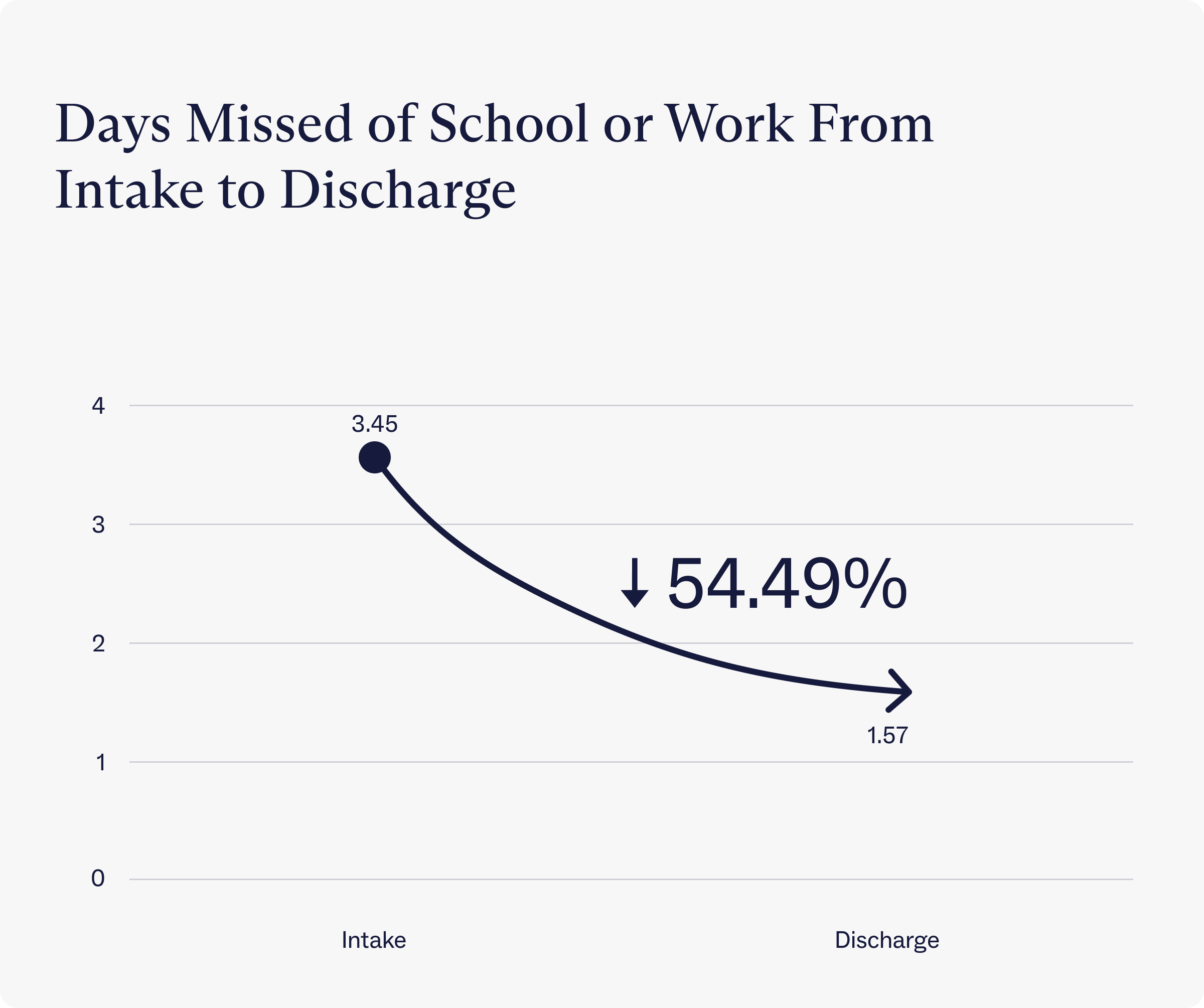
These findings demonstrate that with appropriate treatment, like that offered at Charlie Health, recovering from severe anxiety is possible. Charlie Health Clinical Director Stephanie Stolzenbach said holistic mental healthcare is essential for treating severe anxiety. “Charlie Health treats anxiety from a person-centered and holistic approach. Our clinical team works to build a strong therapeutic relationship with their clients, which allows them to have open conversations and create a treatment plan together that will provide the client with symptom reduction and a pathway toward healing,” she said. Stolzenbach added that when treating clients with anxiety, the Charlie Health team utilizes evidence-based therapies like cognitive behavioral therapy (CBT), prolonged exposure therapy, creative art therapy, and more.
Severe anxiety support at Charlie Health
Here at Charlie Health, we have specific programming for people struggling with severe anxiety and create a personalized, evidence-based treatment plan for each client. Our virtual Intensive Outpatient Program (IOP) combines supported groups, individual therapy, and family therapy to offer holistic healing for those who need more than once-weekly therapy, including young people with severe anxiety.
Cognitive behavioral therapy (CBT) and dialectical behavior therapy (DBT) are two of the most common therapeutic approaches to treating anxiety — both of which are incorporated into Charlie Health’s severe anxiety treatment. Medications have also been shown to help dramatically decrease anxiety symptoms, with research showing that a combination of therapy and medication is the most effective treatment for people with severe anxiety. As such, Charlie Health offers medication management as appropriate.
If you or a loved one are struggling with severe anxiety, Charlie Health is here to help. Fill out this short form to begin your healing journey today.





